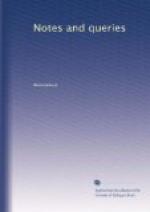“Though they will not for a better
Change a syllable or letter,
Must the Printer’s spots
and stains
Still obscure THE POET’S Strains?
Overspread with antique rust,
Like whitewash on his painted bust
Which to remove revived the grace
And true expression of his face.
So, when I find misplaced B’s,
I will do as I shall please.
If my method they deride,
Let them know I am not tied,
In my free’r course, to chuse
Such strait rules as they would use;
Though I something miss of might,
To express his meaning quite.
For I neither fear nor care
What in this their censures are;
If the art here used be
Their dislike, it liketh me.
While I linger on each strain,
And read, and read it o’er again,
I am loth to part from thence,
Until I trace the poet’s sense,
And have the Printer’s errors
found,
In which the folios abound.”
PERIERGUS BIBLIOPHILUS.
October.
* * * * *
Minor Notes.
Chaucer’s Damascene.—Warton, in his account of the physicians who formed the Library of the Doctor of Physic, says of John Damascene that he was “Secretary to one of the caliphs, wrote in various sciences before the Arabians had entered Europe, and had seen the Grecian philosophers.” (History of English Poetry, Price’s ed., ii. 204.) Mr. Saunders, in his book entitled Cabinet Pictures of English Life, “Chaucer”, after repeating the very words of this meagre account, adds, “He was, however, more famous for his religious than his medical writings; and obtained for his eloquence the name of the Golden-flowing” (p 183.) Now Mr. Saunders certainly, whatever Warton did, has confounded Damascenus, the physician, with Johannes Damascenus Chrysorrhoas, “the {323} last of the Greek Fathers,” (Gibbon, iv. 472.) a voluminous writer on ecclesiastical subjects, but no physician, and therefore not at all likely to be found among the books of Chaucer’s Doctour,
“Whose studie was but litel on the Bible.”
Chaucer’s Damascene is the author of Aphorismorum Liber, and of Medicinae Therapeuticae, libri vii. Some suppose him to have lived in the ninth, others in the eleventh century, A.D.; and this is about all that is known about him. (See Biographie Universelle, s.v.)
ED. S. JACKSON.
Long Friday, meaning of.—C. Knight, in his Pictorial Shakspeare, explains Mrs. Quickly’s phrase in Henry the Fourth—“’Tis a long loan for a poor lone woman to bear,”—by the synonym great: asserting that long is still used in the sense of great, in the north of England; and quoting the Scotch proverb, “Between you and the long day be it,” where we talk of the great day of judgment. May not this be the meaning of the name Long Friday,




